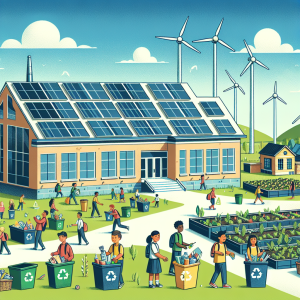Choosing Green: Eco-Conscious Products That Make a Difference
Eco-conscious consumerism has rapidly evolved from a niche interest into a mainstream movement. Individuals worldwide are becoming increasingly aware of the impact their purchasing decisions have on the environment, and as a result, the demand for sustainable products is at an all-time high. This shift is not just a trend, but a significant step toward protecting our planet for future generations. Choosing green products—those that are environmentally friendly—can make a substantial difference. From reducing carbon footprints to supporting ethical practices, harnessing the power of eco-conscious products is essential in our quest for sustainability.
When evaluating eco-friendly products, it’s important to understand the characteristics that truly define them. Unlike products merely marked with buzzwords like “natural” or “organic,” eco-conscious products adhere to specific criteria. One of the first aspects to consider is the lifecycle of the product. The lifecycle approach examines the impact of a product from production to disposal, focusing on how much energy and raw materials are used, how waste is managed, and what the end-of-life process looks like. Products designed with lifecycle considerations aim to minimize environmental harm throughout all stages.
Sustainable materials play a key role in eco-conscious products. Opting for items made from recycled or renewable sources significantly reduces the reliance on finite resources. For instance, bamboo is a fast-growing plant that requires minimal resources, making it an excellent alternative to traditional timber. In the realm of textiles, organic cotton, hemp, and Tencel are favorable choices. Organic cotton is grown without harmful pesticides and synthetic fertilizers, thereby reducing the chemical load on the environment. Hemp, apart from being incredibly durable, requires little water and grows rapidly, while Tencel, derived from sustainably sourced wood pulp, is both biodegradable and low-impact in its manufacturing.
Another vital factor is the longevity and durability of a product, which often translates to fewer resources used over time and less frequent replacements. High-quality, durable items might come with a higher price tag, but they offer long-term savings and environmental benefits. Products designed for longevity often employ timeless rather than trend-driven aesthetics and are built with repairability in mind.
Packaging is another critical area where eco-friendly choices can significantly reduce environmental impact. Brands aiming to be sustainable should prioritize minimalistic packaging that uses recyclable, compostable, or even packaging-free options. Opting for products that use glass, aluminum, or recycled paper packaging instead of single-use plastics can dramatically decrease waste.
Energy efficiency is also a hallmark of eco-conscious products. Items that reduce electricity or fuel consumption can significantly cut down on pollution and resource depletion. Energy Star-rated appliances, for instance, meet strict standards set by the Environmental Protection Agency, ensuring efficiency in use. LED lighting is another excellent choice, using up to 80% less energy than traditional incandescent bulbs while lasting significantly longer.
In the personal care sector, harsh chemicals found in conventional products are replaced with natural, biodegradable ingredients in eco-conscious alternatives. These products often come with the added benefit of being cruelty-free, ensuring no animal testing is involved. Check for certifications like Leaping Bunny or the Cruelty-Free International logo to verify ethical production processes.
Household cleaning products have experienced a revolution as well. Eco-conscious cleaning supplies utilize plant-based and biodegradable ingredients, avoiding toxic chemicals that can harm the environment and human health. Look for familiar certifications like EcoLogo or Green Seal, which can provide assurance of a product’s environmentally sound attributes.
Sourcing and transparency are integral to the ethos of sustainable products. Brands committed to eco-consciousness ensure their supply chain is transparent, ethical, and engaged in fair trade practices. Fair trade certifications ensure that producers, particularly in developing countries, receive fair wages and work under just conditions. Similarly, local sourcing not only supports the local economy but also cuts down on emissions associated with transportation.
The technological sector also has an array of eco-friendly options. Tech companies are increasingly designing products with environment-friendly materials and energy-efficient technologies. Some companies offer programs that promote recycling and refurbished products, reducing electronic waste significantly. Moreover, choosing devices with replaceable batteries and components can further reduce environmental strain by prolonging the life of a product.
Food choices dramatically impact sustainability as well. Supporting organic, locally grown produce reduces the carbon footprint associated with food transportation and promotes biodiversity. Simultaneously, adopting a plant-based diet can significantly minimize the environmental impact, as it generally requires fewer resources than a conventional meat-heavy diet.
To ensure that eco-conscious choices are genuinely making an impact, consumers must foster a mindset of mindfulness and minimalism. The ethos of “less is more” becomes integral; buying fewer, better-quality products that truly meet our needs is a surefire way to cultivate sustainability. Avoiding overconsumption and focusing on truly necessary purchases can reduce environmental pressure significantly.
In summary, the shift towards eco-conscious products involves a multifaceted approach that considers materials, manufacturing, durability, energy efficiency, and ethical practices. By prioritizing products that adhere to these standards, consumers contribute to a market-driven push for sustainability, steering industries towards more environmentally responsible practices. As awareness continues to grow, the compounded efforts of informed consumers worldwide spell a promising future for our planet, where eco-consciousness becomes an integral component of daily life and global commerce.



